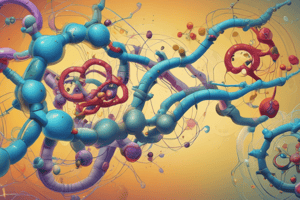Podcast
Questions and Answers
What is biochemistry?
What is biochemistry?
The study of chemical processes within and relating to living organisms.
What are the four primary organic molecules that make up life?
What are the four primary organic molecules that make up life?
Carbon, hydrogen, oxygen, and nitrogen.
What is metabolism?
What is metabolism?
The sum of all chemical processes that occur in living organisms.
Define catabolism and anabolism in metabolism.
Define catabolism and anabolism in metabolism.
What are enzymes?
What are enzymes?
How do enzymes catalyze chemical reactions?
How do enzymes catalyze chemical reactions?
What is the central dogma of molecular biology?
What is the central dogma of molecular biology?
How do proteins play a role in living organisms?
How do proteins play a role in living organisms?
What are some factors that influence enzyme activity?
What are some factors that influence enzyme activity?
What does the cellular environment consist of?
What does the cellular environment consist of?
What is the role of regulation in biochemistry?
What is the role of regulation in biochemistry?
Why is biochemistry considered a bridge between chemistry and biology?
Why is biochemistry considered a bridge between chemistry and biology?
Study Notes
Exploring the Wonders of Chemistry: A Dive into Biochemistry
Biochemistry, a captivating branch of chemistry, is the study of chemical processes within and relating to living organisms. It's not just about the chemistry that happens in test tubes and beakers but a deep understanding of the intricate molecular mechanisms that drive life itself.
The Molecular Building Blocks of Life
Life is primarily composed of four organic molecules: carbon, hydrogen, oxygen, and nitrogen—the building blocks of biochemistry. These elements combine to form the essential macromolecules of life, such as carbohydrates, lipids, proteins, and nucleic acids. These molecules interact with one another in a highly organized manner, forming the structure and function of living cells.
Metabolism: Energy and Substance Exchange
Metabolism is the sum of all chemical processes that occur in living organisms and fuels life. It encompasses two main groups: catabolism and anabolism. Catabolism is the breakdown of organic molecules to release energy, while anabolism is the synthesis of organic molecules from simpler substances. These processes occur via a series of biochemical reactions, driven by enzymes—proteins that specifically catalyze chemical reactions within cells.
Enzymes: The Biocatalysts
Enzymes are proteins that increase the rate of biochemical reactions by providing specific sites for reactant molecules to bind and interact. They are incredibly selective and efficient, facilitating the synthesis and degradation of molecules. Enzyme activity is influenced by several factors, including temperature, pH, and substrate concentration.
Genetics: Information Storage and Transfer
Genetics is a fundamental aspect of biochemistry that focuses on the transmission, storage, and expression of genetic information within an organism. DNA (deoxyribonucleic acid) is the molecule that stores this genetic information, while RNA (ribonucleic acid) transfers it during protein synthesis. The central dogma of molecular biology—the flow of information from DNA to RNA to protein—helps us understand how genetic information is translated into biological function.
Proteins: The Workhorses of Life
Proteins are large biomolecules made up of amino acids linked together in a specific sequence. They fold into unique three-dimensional structures that determine their function in living organisms. Proteins play a wide variety of roles, such as enzymes, structural components, and signaling molecules. Changes in protein structure, function, or expression can lead to biological disorders like diseases, making the study of proteins a critical aspect of biochemistry.
The Cellular Environment
The cellular environment is essential for understanding biochemistry, as it provides the setting for chemical processes to occur. A cell's environment includes various molecular components, such as water, ions, and organic molecules, that are essential for maintaining cellular function. Membranes, made of phospholipids, separate cellular compartments and regulate the movement of molecules in and out of cells.
Regulation: A Balancing Act
Regulation in biochemistry refers to the fine-tuning of biochemical processes to maintain homeostasis within and between organisms. This involves controlling the rate, extent, and direction of chemical reactions. Regulatory mechanisms include allosteric regulation, post-translational modification, and gene regulation at the transcription and translation levels.
Biochemistry is a vast and endlessly fascinating field, offering unique insights into the complexities of life. It is the bridge between chemistry and biology, providing a deeper understanding of the relationship between molecules and their role in living organisms. Through studying biochemistry, we also gain a better appreciation of the molecular basis of diseases and the potential for therapeutic interventions.
Studying That Suits You
Use AI to generate personalized quizzes and flashcards to suit your learning preferences.
Description
Delve into the captivating world of biochemistry, where the chemical processes within living organisms unfold. From the building blocks of life to the intricate roles of proteins and enzymes, this quiz will take you on a journey through the wonders of biochemistry.



